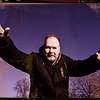Name: Pyrolator
Occupation: Producer, performer, composer, sound artist
Nationality: German
Current release: Pyrolator is one of the artists featured on Compost Record's formidable Future Sounds of Kraut compilation, curated by Fred und Luna. Order the vinyl here.
Kraut-related recommendations: Thomas Klein captures the spirit of this time very well with his project "Sølyst", which has already released 6 albums since 2011.
Of the "New Kraut" albums, I also really like the album Système Solaire by Camera, for which I was even allowed to do a remix (under a pseudonym).
[Read our Fred und Luna interview]
If you enjoyed this Pyrolator interview and would like to stay up to date with his music and projects, visit his official homepage. He is also on Instagram, and Facebook.
How would you describe your personal relationship with Krautrock?
At the time when the Kraut-music groups were active, I actually only listened to English and American music, with a few exceptions. It was only much later that I began to listen to the music of the time and learn to appreciate it.
In his Krautrock Sampler, Julian Cope suggests that the actual Krautrock phase lasted only a few years. Are you interested in the history of Kraut – and if so, what are defining moments for you? Where do you draw the bracket for the first, classic period?
Julian Cope is right, there was a large amount of music that is now considered Krautrock, which encompasses a wide range of different musical styles.
I see the classic period between 1969 and 1973.
Kraut drew inspiration from a lot of influences. Which of these would you say were most prominent?
For me personally, the early albums by Can, Neu! and Kraftwerk definitely defines the style, especially the drumming style of Klaus Dinger.
What was it about Krautrock that particularly attracted you as a listener?
It was the hypnotic and repetitive style of the music that drew me in. When Jacki Liebezeit (Can) played, you were under his spell.
Tell me about the albums and artists that stand our for you?
As already said, the first album of Neu! with the track "Hallogallo" and the first album of Kraftwerk with the track "Ruckzuck" are the best that this music genre has produced.
From Can especially the first three albums are worth mentioning.
Some believe the well for discovering hidden Kraut gems has dried up. Do you still stumble upon amazing music from the magic Kraut era that you'd never heard (of) before? Do you think there are still vaults with hidden gold in them?
For me it was very surprising to learn that the famous German hardrock band Scorpions started their career in 1972 with a Kraturock album, a nice example is the track "It All Depends".
What, to you, are the main elements that make something Kraut? What are the practises of the musicians from the 70s that inspire your own practise today?
I once saw Jaki Liebezeit in the Can studio throwing ping pong balls on a plate and trying to play the bounce back of the balls exactly on the snare.
For me, precision, ecstasy and hypnotic rhythms are the elements that make this music interesting for me.
When did you start making use of Kraut elements in your music?
Subconsciously very early on, for sure, but consciously only in the last 20 years.
Could you describe your creative process on the basis of one of your own Kraut-leaning pieces, live performances or albums that's particularly dear to you, please?
If I get into a kind of meditative state while making music and try to make music in a more strict psychedelic sense (psychedelic - from the Greek = opening the soul), then in the best case such hypnotism can arise.
I got into Kraut via Tangerine Dream and early Ash Ra and to me, the motoric beat was never quite as important. Today, it seems as though it's the most defining element. Are you interested in it? Are you making use if it? What makes it special to you?
I agree, the rhythm is the important element.
The countless sprawling guitar solos interest me less, it is the interplay of musicians who ride as if on a common wave, the rhythm is the supporting element.
Pyrolator Interview Image by Neal McQueen
It would seem that to Julian Cope, the prominent inclusion of synthesizers was somewhat of an exclusion criterion for Krautrock. Interestingly, today, they are a signature element. What role do they play for your own view of Kraut and your own music?
I see it differently than Julian Cope. Only the possibilities of electronics, be it effects devices, modified organs, or even synthesizers have shaped the sound of the time.
For me as a synth player I always listen exactly where the boundaries of the conventional sounds of the instruments are exceeded and these border crossings from the normal beat band sound to the typical Kraut Rock sound can be heard clearly in the electronic extensions.
A lot of the Kraut spirit came to life through musicians living in communities, playing and recording together every single day. From your perspective, how does this change the results? Have you ever tried working and creating in such a constellation?
Haha, that's funny that they ask about that, but actually I lived in a kind of country commune at the end of the 70s, where we lived from running a country pub and made music together during the day.
Out of this commune came the band Deutsch-Amerikanische-Freundschaft, because we were no longer interested in "hippie music" and wanted to start a new wave.
Did you ever visit one of the birthplaces of the genre – Berlin, Düsseldorf, Munich – or any spaces related to the history of Kraut?
I was born in Düsseldorf, knew some of the protagonists of the music of the time personally, and have lived in Berlin for the last 12 years.
A good friend of mine is Werner Pieper, the publisher of the German translation of Julian Cope's standard work on Krautrock (Der Grüne Zweig 186) and in the 80s I was regularly at his "Full Moon Festival" in the Odenwald, where Conrad Schnitzler or Mani Neumeier could run into each other.
Do you own any paraphernalia from the era?
Werner Pieper, I just mentioned before, gave me LPs with hand-printed covers by Conrad Schnitzler and other things when he heard that I had edited an album of tracks by him. (Pyrolator&Schnitzler - Con-Struct)
There are quite a few fantastic compilations of modern Kraut-oriented music. I am wondering, however, if the approaches of this time may have survived more subtely. Do you see the influence of Krautrock in any contemporary styles, approaches or scenes which bear no obvious similarities with Kraut?
As already mentioned, the rhythm played by Klaus Dinger is what defined this style - it is a way of playing without shuffling and with a very 8th-note emphasis, an element in the music that you can still hear again and again today.





